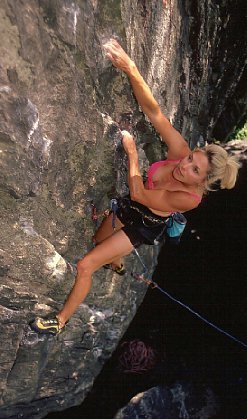Building "Mental Muscle"
 The late, great Wolfgang Güllich was fond of saying that "the brain is the most important muscle for climbing." What makes this statement even more provocative is the fact that Güllich was one of the strongest to ever pull down on stone. Anyway, I agree completely with Wolfie's sentiment that a serious climber must be equally serious about mental training.
The late, great Wolfgang Güllich was fond of saying that "the brain is the most important muscle for climbing." What makes this statement even more provocative is the fact that Güllich was one of the strongest to ever pull down on stone. Anyway, I agree completely with Wolfie's sentiment that a serious climber must be equally serious about mental training. Consider that everything you are and will become is a direct function of your thoughts. Thoughts are precursors to almost every significant action you make, including most climbing moves and all training exercises. Given this perspective, what could be more central to improving performance than fostering curious, proactive, and goal-directed thoughts that will direct high quality actions?
Beginning today, strive to regularly tune into your thoughts and emotions. It's also important to develop higher awareness of how your body reacts to the mental "ups" and "downs." Given this heighten awareness, you can proactively optimize your mental and physical state. For instance, when you recognize negative, fearful thinking, you can immediately supplant such thoughts with positive imagery and productive self-talk. Or, when you identify growing physical tension you can engage in slow, deep breathing and redirect your thinking to a calming topic.
The impact of improving the quality of your thinking can't be overstated both in terms of immediate results and long-term improvement. The goal is to modify your thinking in ways that will help you solve problems (instead of wallowing in them), challenge fears (instead of avoiding them), and compel intelligent action toward your goals (instead of backpedaling at the first sign of adversity). These very specific ways of thinking are the essence of mental toughness--a hallmark of top climbers (and peak performers) the world over, and something your should aspire to develop as well.



 Subscribe to Eric's RSS Feed
Subscribe to Eric's RSS Feed
 Subscribe to Eric's RSS Feed
Subscribe to Eric's RSS Feed